Tilda®, the UK’s best-selling rice brand, has now successfully recruited all of the farmers it works with in northern India to adopt the Alternate Wetting and Drying (AWD) method of growing Basmati rice – a major milestone in its sustainability journey. The breakthrough means that every farmer in Tilda’s northern Indian supply chain is now using a growing method proven to cut methane emissions, one of the most potent greenhouse gases associated with traditional rice farming.
 In conventional rice farming, fields are kept permanently flooded, which requires vast amounts of water and creates the oxygen-free conditions that generate methane as rice plants grow. AWD is a water-saving irrigation technique developed by the International Rice Research Institute (IRRI). Instead of continuous flooding, fields are allowed to dry intermittently before being re-flooded, with farmer using a simple perforated tube inserted in the soil to indicate when re-flooding needs to occur. This significantly reduces the amount of water used and the length of time fields remain flooded, thereby cutting methane emissions by as much as 45%, while also saving energy used for irrigation.
In conventional rice farming, fields are kept permanently flooded, which requires vast amounts of water and creates the oxygen-free conditions that generate methane as rice plants grow. AWD is a water-saving irrigation technique developed by the International Rice Research Institute (IRRI). Instead of continuous flooding, fields are allowed to dry intermittently before being re-flooded, with farmer using a simple perforated tube inserted in the soil to indicate when re-flooding needs to occur. This significantly reduces the amount of water used and the length of time fields remain flooded, thereby cutting methane emissions by as much as 45%, while also saving energy used for irrigation.
The AWD programme, launched in 2021, has now scaled dramatically since the publication of Tilda’s 2023–2024 Impact Report, with more than 3,240 farms covering 10,900 hectares now adopting the practice – a 155% increase in just one year.
The results, taken from a review covering the 2023 and 2024 growing cycles, are striking. Compared with conventional flooded rice cultivation, AWD farms have:
- Cut methane emissions by up to 45%
- Reduced average carbon footprints to 766 kg CO2e per tonne of rice, compared with 1,177 kg for non-AWD farms
- Saved more than 22 billion litres of water annually — equivalent to the consumption of 428,000 UK adults
- Used 18.8% less fertiliser per hectare and 24.3% less per tonne of rice
- Achieved yield gains of nearly 6% and farm income increases of 7% per hectare
Jean-Philippe Laborde, Managing Director of Tilda®, explains: “We are immensely proud of the progress the farmers that we work closely with are making. AWD has already transformed the climate and economic footprint of Basmati farming. Sustainability is about continuous improvement, and this milestone shows what can be achieved when business, science and farmers work together.”
Tackling the next frontier: nitrous oxide
While AWD is proven to reduce methane and water use, scientists have identified a new challenge: nitrous oxide (N2O), a greenhouse gas almost 300 times more damaging to the climate than carbon dioxide. Drier soils under AWD expose synthetic fertilisers to oxygen, stimulating nitrous oxide release and offsetting an estimated 10–15% of AWD’s methane reduction benefits.
To address this, Tilda and academic partners are now testing biofertilisers containing beneficial arbuscular mycorrhizal (AM) fungi. Early comparisons between fields treated with locally available “mycorrhizae” products (applied alongside urea) and those using synthetic fertilisers alone have shown stronger root growth, improved plant performance, and in one case, a farmer-reported yield gain of up to 20%.
Although these trials still involve synthetic fertiliser use, the results are so encouraging that Tilda will continue the research next year to investigate whether synthetic inputs can be progressively reduced or replaced with biofertilisers — while carefully assessing their overall sustainability.
Dr. Emily Servante, Postdoctoral Research Associate at the University of Cambridge Crop Science Centre and Tilda’s lead scientific partner, adds: “These early results are extremely encouraging. We’ve confirmed that AM fungi naturally associate with Pusa Basmati rice, and that biofertilisers can enhance root development and crop vigour. While we haven’t yet shown a reduction in fertiliser inputs, the positive crop response makes this a very exciting avenue to explore. Our next step is to quantify these benefits at scale, investigate whether fertiliser use can be reduced, and ensure that any inputs are truly sustainable.”
Looking ahead
As the first UK rice company to achieve B Corp certification, Tilda remains committed to evidence-led sustainability. With AWD adoption now universal across its farming base in northern India, and biofertiliser trials entering their next phase, the company aims to halve emissions across its supply chain by 2030 and provide a blueprint for sustainable rice production globally.



Comments are closed.